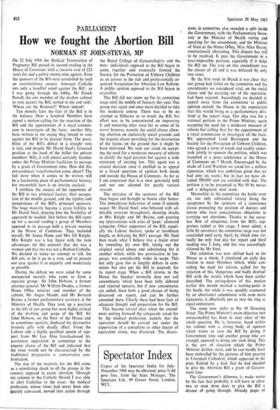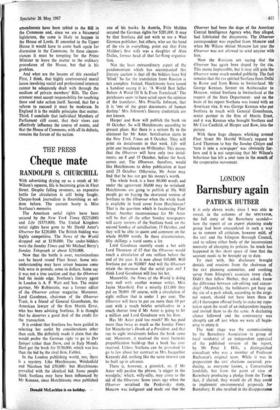How we fought the Abortion Bill
PARLIAMENT NORMAN ST JOHN-STEVAS, MP
On 22 July 1966 the Medical Termination of Pregnancy Bill passed its second reading in the House of Commons with a massive vote of 223 votes for and a paltry twenty-nine against. Even the sponsors of the Bill were astonished by such an overwhelming success. Amongst Catholic Mrs only a handful voted against the Bill: as I was going through the lobby, Mr Enoch Powell, the one member of the shadow cabinet to vote against the Bill, turned to me and said: `Where are the Romans?' Where indeed!
Ten months later the fate of the Bill is in the balance. Over a hundred Members have signed a motion calling for the rejection of the Bill and the appointment of a royal commis- sion to investigate all the facts: another fifty have written to me saying they intend to vote against the Bill in its present form. The possi- bility of the Bill's defeat in a straight vote is real, and despite Mr David Steel's favoured position at the head of the ballot for private members' Bills, it will almost certainly founder unless the Prime Minister facilitates its passage by a grant of Government time. How did this extraordinary transformation come about? The full story when it comes to be written will be a fascinating piece of parliamentary history, but meanwhile here is an interim analysis.
I attribute the success of- the opponents of the Bill to two principal factors, their occupa- tion of the middle ground, and the rigidity and inexperience of the Bill's principal sponsors. The huge majority became a grave liability to Mr David Steel, denying him the flexibility of approach he needed. Just before the Bill came up for a second reading a group of Members opposed to its passage held a private meeting in the House of Commons. They included myself, Mr James Dunn and Mrs Jill Knight. Mrs Knight was a key figure with the twin advantages (in this context) that she was a woman and that she was not a Roman Catholic. We decided to make no attempt to talk the Bill out, to let it go to a vote, and to present our case against it as cogently and moderately as possible.
During the debate we were aided by some unexpected recruits who came to form a separate group: Sir John Hobson, a former attorney-general, Mr William Deedes, a former Home Office minister and member of the cabinet, Mr Angus Maude, and Mr Bernard Braine, a former parliamentary secretary at the Ministry of Health. They took up a position to the left of our group but were highly critical of the drafting and scope of the Bill. Sir John Hobson, on the floor of the House and in committee upstairs, deployed his destructive forensic gifts with deadly effect. From the Labour side a highly qualified speech of sup- port from Mr Leo Abse foreshadowed his passionate opposition in committee to the eugenic clause of the Bill and indicated that the issue would not be characterised by the traditional progressive v. conservative con- frontation.
The size of the majority for the Bill came as a stimulating shock to all the groups in the country opposed to easier abortion. Through my column in the Catholic Herald I was able to alert Catholics to the issue: the medical profession, whose views had never been ade- quately canvassed, moved into action through
the Royal College of Gynaecologists and the BMA : individuals opposed to the Bill began to
come together and eventually formed the Society for the Protection of Unborn Children as an answer to the rich and professionally or- ganised Association for Abortion Law Reform. A public opinion opposed to the Bill began to crystallise.
The Bill did not come up for its committee stage until the middle of January this year. Our group met again and once more decided to take the moderate course. There was to be no attempt to filibuster or to wreck the Bill, but effort was to be concentrated on improving it and removing what were for us some of its worst features, namely the social clause allow- ing abortion on exclusively social grounds and the eugenic clause providing for the destruction of the foetus on the ground that it might be born deformed. We took our stand on accept- ing the need for a moderate measure of reform to clarify the legal position but against a wide extension of existing law. This again was a crucial decision since it enabled us to appeal to a broad spectrum of opinion both inside and outside the House of Commons. As far as I am concerned that is a view genuinely held and not one adopted for purely tactical reasons.
The mistakes of the sponsors of the Bill then began and brought us bonus after bonus. The immoderate behaviour of some (I entirely acquit Mr David Steel, who behaved with ad- mirable restraint throughout), shouting insults at Mrs Knight and Mr Braine, and greeting my interventions with cries of 'pope,' alienated sympathy. Other supporters of the Bill, especi- ally the Labour doctors, spoke at inordinate length, so delaying the Bill's passage. Mr Steel then made what I believe was a major error by amending his own Bill, taking out the original social clause and substituting for it another which, while less provocative in lan- guage, was considerably wider in scope. This not only gave rise to lengthy debate in com- mittee but also put the Bill in jeopardy for its report stage. When a Bill returns to the House the Speaker normally does not call amendments which have been fully debated and rejected upstairs, but if new amendments are added, these haVe a good chance of being discussed on report, and can be further amended there. Clearly there had been lack of adequate thought and preparation for the Bill.
This became crystal clear when the amend- ment putting forward the safeguards asked for by the medical profession, namely that the operation should be carried out under the supervision of a consultant or other doctor of equivalent status, was discussed. The discus- sions in committee also revealed a split inside the Government, with the Parliamentary Secre- tary to the Minister of Health voting and speaking for the amendment, and the Minister of State at the Home Office, Miss Alice Bacon, ostentatiously abstaining. This dispute has still to be resolved. It puts the Government in a near-impossible position, especially if it helps the Bill on. The vote on this amendment was the closest of all and it was defeated by only two votes.
By the first week in March it was clear that our group had failed on the committee and the amendments we considered vital, on the social clause and the carrying out of the operation, had been rejected. Accordingly we decided to appeal away from the committee to public opinion outside the House in the expectation that this would bring us a parliamentary divi- dend at the report stage. Our idea was for a national petition to the Prime Minister, again accepting the need for a moderate measure of reform but calling first for the appointment of a royal commission to investigate all the facts. We approached Lord Barrington and the Society for the Protection of Unborn Children, who agreed a form of words and readily under- took jointly to sponsor the petition, which was launched at a press conference at the House of Commons on 7 March. Encouraged by the shade of Lord Woolton we asked for a million signatures, which was ambitious given that we had only six weeks, but in fact we have ob- tained 500,000 and are satisfied with that. The petition is to be presented at No 10 by nurses and a delegation next week.
Meanwhile in the committee the battle went on, our only substantial victory being the acceptance by the sponsors of a conscience clause protecting the position of doctors and nurses who have conscientious objections to
carrying out abortions. Thanks to the cease-
less flow of eloquence from the Bill's sup- porters (aided at this stage, I must admit, a little by ourselves) the committee stage was not concluded until early April, by which time vir- tually the only free day for report and third reading was 2 June, and this was accordingly claimed by Mr Steel.
Our attention was now shifted back to the House as a whole. I circulated an early day motion to most Members which, while con- ceding the need for reform, called for the rejection of this 'dangerous and badly drafted' Bill with the results which have been earlier described. The setting-down of this motion earlier this month marked a turning-point in the battle, for while it was speedily countered by an abortionist amendment with even more signatures, it effectively put us into the ring as equal contestants.
The scene now shifts to No 10 Downing Street. The Prime Minister's main objective (not unreasonably) has been to steer clear of the whole question. He is, however, faced within the cabinet with a strong body of opinion which wants to save the Bill by giving it Government time and another group who are strongly opposed to doing any such thing. This is the sort of situation which the Prime Minister dislikes most, and he can hardly have been enthralled by the pictures of him praying in Liverpool Cathedral, which appeared in the press flanked by a leak that he had decided to give the Abortion Bill a grant of Govern- ment time.
The Government's dilemma is made worse by the fact that probably it will have to allow two or even three days to give the Bill a chance of going through. Already pages of
amendments have been tabled to the BM in the Commons and, since we are a bicameral legislature, the same is likely to happen in the House of Lords. If amended in the Upper House it would have to come back again for discussion in the Commons. In these ciacum- stances it must be tempting for the Prime Minister to leave the matter to the ordinary procedures of the House, but that is his problem.
And what are the lessons of this exercise? Fust, I think, that highly controversial moral issues involving social and professional interests cannot be adequately dealt with through the medium of private members' Bills. The Gov- ernment must accept responsibility for resolving these and take action itself. Second, that for a reform to succeed it must be moderate. In England it is the middle principles that matter. Third, I conclude that individual Members of Parliament still count, that their views can effectively influence the course of events, and that the House of Commons, with all its defects, remains the forum of the nation.



































 Previous page
Previous page